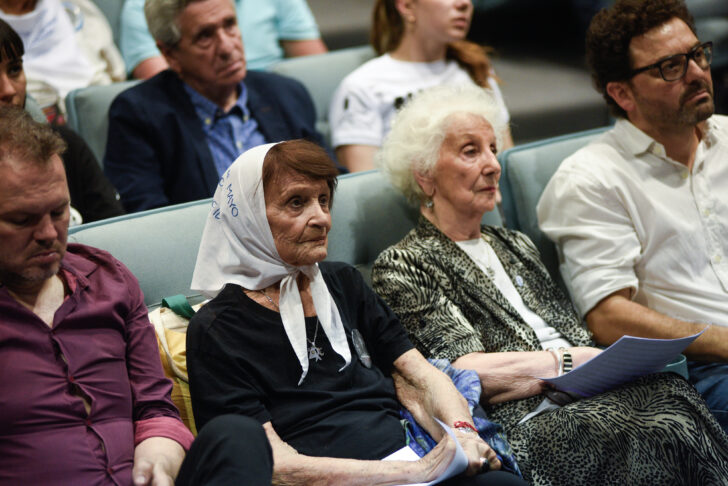On Thursday, November 14, Argentina appeared before the Inter-American Commission on Human Rights (IACHR) to address three thematic hearings requested by civil society organizations on the state of human rights in the country. The representatives of President Javier Milei’s administration demonstrated an aggressive demeanor and fell short of the expectations for a state in this setting. Poorly prepared, they provided fragmented and incomplete responses to questions from IACHR commissioners.
On the impact of economic adjustments on impoverished sectors
In the first hearing, which focused on the economic adjustment policies and their impact on the quality of life for working- and lower-middle-class sectors, the Argentine government was unable to defend its social, labor, and housing policies against human rights standards. The presentation was vague, and Secretary of Human Rights Alberto Baños did not address the concerns raised by civil society organizations and the IACHR. For instance, there was no response regarding measures to ensure the rights of children and adolescents or to prevent setbacks in social policy.
Baños was the only representative to speak, with no participation from other officials responsible for decisions affecting human rights access for hundreds of thousands, such as those from the Ministry of Human Capital or the Undersecretariat for Urban and Social Integration. In the absence of concrete answers, Baños promised to submit a written report. Meanwhile, the commissioners underscored the importance of the state’s accountability and emphasized that human rights standards prohibit regression in rights guarantees.
On gender-based violence and access to sexual and reproductive health
In the second hearing on gender policies, Secretary Baños once again declined to answer questions directly, stating that he would provide written responses later. He read a report attempting to justify economic austerity measures and the weakening of institutions addressing gender-based violence, asserting that “if the economy improves, so will women’s lives.”
Furthermore, Argentina’s representative to the IACHR spoke of “violence in all its forms,” delivering a speech rife with gender-denialist rhetoric—ironically, on the same day that Argentina was the only country at the UN to vote against a resolution to eradicate violence against women. After listening to Baños’s remarks, Commissioner José Luis Caballero pointedly responded, “What is not named does not exist.” Commissioner Roberta Clarke also added, “The work that we have been doing over the last 40 years has been to raise the visibility and understand the specificity of violence against women and girls—which by the way is the most perpetuated form of violence of all forms of violence—and we have to call it that because it draws our attention to policy and action response within the International Human Rights Framework.” And she advised, “I ask you, Ambassador, to use your good offices to have the conversation about why we have to name it.”
The government acknowledged institutional degradation and downsizing in key areas, justifying these measures in terms of supposed efficiency but failing to recognize the increased vulnerability this creates for women and gender-diverse individuals. For instance, the Acompañar program, which provides support to survivors of gender violence, saw a 98% reduction, leaving thousands of women in extreme danger without support.
Contrary to national laws, Baños asserted that Argentina protects life from conception and claimed that since the Voluntary Interruption of Pregnancy law was passed in late 2020, “245,000 children have been aborted.” Meanwhile, the government declared the ENIA Plan—which had reduced teenage pregnancy by 50%—a “failure” and did not respond regarding the discontinuation of medications for sexual and reproductive health.
On memory, truth, and justice policies
In the third and final thematic hearing, the Argentine representatives openly conveyed the Executive’s stance on the country’s last military dictatorship. Juan Battaleme, the representative from the Ministry of Defense, justified dismantling the team responsible for examining Armed Forces records, labeling them a group of “avengers,” and stating that the administration’s goal is to ensure “complete memory.” In doing so, he demonstrated a lack of understanding of basic standards for handling records related to crimes against humanity.
Furthermore, while IACHR members used their time to acknowledge the work of the Mothers and Grandmothers of Plaza de Mayo, the Secretary of Human Rights expressed only disdain and frustration at being held accountable.
“Being accused of seeking vengeance brings me back to the times when I was appropriated,” responded Claudia Poblete from the Grandmothers of Plaza de Mayo, after repeated verbal attacks during the hearing and apologizing for the personal nature of her statement. “It is the perpetrators’ rhetoric—the same words I was raised with to prevent me from seeking my identity.”
As in the previous two hearings, the Argentine government sought to justify its changes in memory, truth, and justice policies as necessary due to the country’s economic crisis. In response, Verónica Torras, Director of Memoria Abierta and a member of the CELS Board of Directors, highlighted what she described as the government’s “militaristic fervor.” She explained: “The government believes the Armed Forces have been humiliated by the memory, truth, and justice process. It glorifies their role during the State terrorism, promotes their involvement in internal security, significantly increases the Defense, Security, and Intelligence budgets, while restricting funding for numerous public policies.”
Photo: Maria Eugenia Cerruti / CELS

